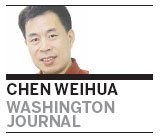Abe's view of history upsets many in Asia, the US
Updated: 2013-05-22 11:06
By Chen Weihua (China Daily)
|
||||||||

Back in February, Prime Minister Shinzo Abe gave a speech at a Washington think tank on the theme "Japan Is Back" that was widely interpreted as a bid to revive his country's long-stagnant economy through drastic policy changes.
"Abenomics", as these proposals have been dubbed, is a kind of shock therapy that includes stimulus spending, a loose-money policy and a weaker yen. It has already begun boosting exports, stock prices and growth prospects in the world's third-biggest economy.
A Japanese economic revival, of course, would be good for the island nation, the Asia-Pacific region and the world. But alongside Abenomics there has been a resurgence of rhetoric and actions in Japan, particularly among senior politicians, about the country's role in history.
The words and deeds have alarmed Japan's neighbors - China, the Republic of Korea and the Democratic People's Republic of Korea all suffered greatly from Japanese militarism in World War II - but also reverberated in the United States and other nations.
Addressing the upper house of Japan's Diet in late April, Abe dismissed the notion that the country's wartime actions amount to "aggression", saying such a definition has yet to be "firmly determined" by academics or the international community.
Many on the political right in Japan, including Abe, have long argued that Japanese actions back then were not aggression, but acts of self-defense that were also meant to liberate Asian nations from Western domination.
The prime minister also told members of parliament that he wouldn't uphold "all" of a 1995 statement by his predecessor Tomiichi Murayama officially apologizing for "tremendous damage and suffering to the people of many countries" caused by Japan.
Abe has refused to criticize a visit last month to the Yasukuni Shrine by 168 Japanese lawmakers and cabinet members. The shrine honors 2.5 million Japanese war dead, including war criminals convicted by the US-led International Military Tribunal for the Far East in 1946, also known as the "Tokyo trials".
Although he didn't visit the shrine himself, Abe gave a ritual offering of a tree branch shortly before the largest visit by Japanese officials there in 24 years.
He has been to Yasukuni several times before, most recently as leader of Japan's center-right Liberal Democratic Party in October. Abe didn't visit during his first term as prime minister, in 2006-07, but after winning election in December, the 58-year-old leader expressed regret that he couldn't do so.
Whether intentional or not, Abe angered Chinese recently when he posed for a photo in the cockpit of a military training jet painted with the number "731". Unit 731 was a notorious covert biological and chemical weapons research team of Japan's Imperial Army that experimented on people in northeastern China during World War II.
Abe has also sought to weaken the antiwar provisions of Japan's constitution so that the national Self-Defense Forces can become a full-fledged military. At $60 billion a year, Japanese defense spending is now fifth in the world, on par with that of the United Kingdom and trailing only the US, China and Russia.
As Abe revealed his conservative stance, Osaka Mayor Toru Hashimoto, a co-leader of Japan's nationalist Restoration Party, outraged many in Asia and the US by recently denying that wartime "comfort women" were forced into sexual servitude through a system of violence, threats and abduction.
After US officials condemned those words, Hashimoto said last week that US troops based in southern Japan should patronize legal adult-entertainment establishments to reduce sex crime there. He argued that US servicemen abused women during their occupation of Japan and in the Vietnam War.
Opinion polls released this week show most Japanese disapprove of the mayor's views. The newspaper Mainichi Shimbun reported that 71 percent of respondents to one survey called his comments inappropriate.
Meanwhile, several South Korean women who were forced into "comfort women" brothels during the war have been in Japan to educate the public about their experiences.
Among those outraged by attempts to whitewash World War II history is ROK President Park Geun-hye, who on her recent visit to the US told an interviewer: "The Japanese have been opening past wounds and have been letting them fester." She later told a joint session of Congress that "those who are blind to the past cannot see the future".
While major American media outlets and some US officials have condemned Japan over its words and actions, neither President Barack Obama nor Secretary of State John Kerry has spoken publicly about the matter.
In his speech three months ago at Washington's Center for Strategic and International Studies, Abe said his task is "to look toward the future" and make Japan an "ever-more-trusted partner for the region and the world". His actions and assessment of history, however, would seem to make the prime minister's task ever more difficult.
Contact the writer at chenweihua@chinadailyusa.com

 Michelle lays roses at site along Berlin Wall
Michelle lays roses at site along Berlin Wall
 Historic space lecture in Tiangong-1 commences
Historic space lecture in Tiangong-1 commences
 'Sopranos' Star James Gandolfini dead at 51
'Sopranos' Star James Gandolfini dead at 51
 UN: Number of refugees hits 18-year high
UN: Number of refugees hits 18-year high
 Slide: Jet exercises from aircraft carrier
Slide: Jet exercises from aircraft carrier
 Talks establish fishery hotline
Talks establish fishery hotline
 Foreign buyers eye Chinese drones
Foreign buyers eye Chinese drones
 UN chief hails China's peacekeepers
UN chief hails China's peacekeepers
Most Viewed
Editor's Picks

|

|

|

|

|

|
Today's Top News
Shenzhou X astronaut gives lecture today
US told to reassess duties on Chinese paper
Chinese seek greater share of satellite market
Russia rejects Obama's nuke cut proposal
US immigration bill sees Senate breakthrough
Brazilian cities revoke fare hikes
Moody's warns on China's local govt debt
Air quality in major cities drops in May
US Weekly

|

|







